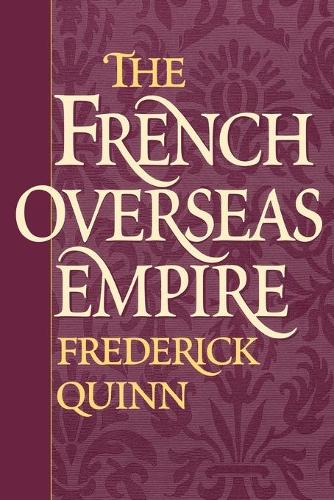
The French Overseas Empire
(Paperback)
Available Formats
Publishing Details
The French Overseas Empire
By (Author) Frederick Quinn
Bloomsbury Publishing PLC
Praeger Publishers Inc
30th October 2001
United States
Classifications
Tertiary Education
Non Fiction
General and world history
Indigenous peoples / Indigeneity
909.0971244
Physical Properties
Paperback
336
Width 156mm, Height 235mm
539g
Description
For more than five centuries France has been both a European and a global power. French explorers, traders, settlers, soldiers and missionaries journeyed to the world's farthest reaches establishing colonies, bringing millions of people under French influence and claiming vast expanses of forests, jungles, deserts, and rich mineral and maritime resources. Through continued wars with rival powers, including Spain, Portugal, Great Britain, and Germany, France lost large portions of its empire and gained others. Century-long conflict with some of its most valued possessions, such as Vietnam and Algeria, further hastened the empire's demise after World War II. This is a story of colorful personalities and dramatic events: Cartier's exploration of Canada, Richelieu's and Colbert's global trading companies, Champlain the colonizer, the French presence in Louisiana, the vast but short-lived French empire in India, the nefarious slave trade, and France's defeat in its prosperous Caribbean colony, St. Dominque. Later chapters survey France's important colonial lobby, the administration of colonies, the impact of World War I, the Colonial Expansion of 1931, the rise of labor unions and nationalist movements. Other chapters cover events related to World War II, Free France vs. Vichy, General de Gaulle, Ho Chi Minh, Dien Bien Phu, Algerian independence, the emergence of a generation of African independence leaders like Flix Houphout-Boigny and Lopold Sdar Senghor, the short-lived Community (1958-1960), and French relations with its overseas partners in a post-independence era. Drawing on the work of visual artists, creative and popular writers, and discussing the impact of science and technology on colonial life, the author paints a vivid picture of empire, including scenes of everyday life in overseas settings.
Reviews
.,."the book succeeds admirably in presenting a wealth of information to a general audience in a straightforward way....the organization is clear and the style is quite accessible....the book is a solid introduction to its subject, and general readers will be able to lean a great deal from it."-The International History Review
...the book succeeds admirably in presenting a wealth of information to a general audience in a straightforward way....the organization is clear and the style is quite accessible....the book is a solid introduction to its subject, and general readers will be able to lean a great deal from it.-The International History Review
[Quinn] is good at pointing out the forms of conscious or unconscious racism that permeated French behavior and culture, and his account of French colonialism from the sixteenth century...to the empire's collapse after World War Two is comprehensive...a solid and impressive achievement.-Foreign Affairs
So many works on French colonial history have appeared in the last twenty years, it is time for an overall assessment of that literature. The appearance of the first full English survey on the subject since the two volumes on the subject by Herbert Ingram, published over sixty years ago, should therefore be welcomed.-Canadian Journal of History
This is a well-crafted and detailed history of French exploration and conquest from the century to the independence of Algeria in July 1962....it is a useful survey history and reference work.-The Journal of Military History
"Quinn is good at pointing out the forms of conscious or unconscious racism that permeated French behavior and culture, and his account of French colonialism from the sixteenth century...to the empire's collapse after World War Two is comprehensive...a solid and impressive achievement."-Foreign Affairs
..."the book succeeds admirably in presenting a wealth of information to a general audience in a straightforward way....the organization is clear and the style is quite accessible....the book is a solid introduction to its subject, and general readers will be able to lean a great deal from it."-The International History Review
"[Quinn] is good at pointing out the forms of conscious or unconscious racism that permeated French behavior and culture, and his account of French colonialism from the sixteenth century...to the empire's collapse after World War Two is comprehensive...a solid and impressive achievement."-Foreign Affairs
"This is a well-crafted and detailed history of French exploration and conquest from the century to the independence of Algeria in July 1962....it is a useful survey history and reference work."-The Journal of Military History
"So many works on French colonial history have appeared in the last twenty years, it is time for an overall assessment of that literature. The appearance of the first full English survey on the subject since the two volumes on the subject by Herbert Ingram, published over sixty years ago, should therefore be welcomed."-Canadian Journal of History
Author Bio
FREDERICK QUINN, an American diplomat and historian, who is a frequent visitor to the French Empire and written about the country's overseas presence for nearly three decades. His foreign service assignments in Francophone countries include Morocco, Haiti, Burkina Faso, Vietnam, and Cameroon. The Times Literary Supplement named his book, Democracy at Dawn: Notes from Poland and Points East, one of its international books of the year for 1998.
